Bias-Free Language
The American Psychological Association emphasizes the need to talk about all people with inclusivity and respect. These guidelines for bias-free language contain both general guidelines for writing about people without bias across a range of topics and specific guidelines that address the individual characteristics of age, disability, gender, participation in research, racial and ethnic identity, sexual orientation, socioeconomic status, and intersectionality. These guidelines and recommendations were crafted by panels of experts on APA’s bias-free language committees.
Racial Equity Tools
Racial Equity Tools is designed to support individuals and groups working to achieve racial equity. This site offers tools, data collection methods, research and tips for people who want to increase their own understanding and to help those working toward justice at every level – in systems, organizations, communities and the culture at large.
How to Embed a Racial and Ethnic Equity Perspective in Research
Another step-by-step guide shares background literature and advice on how to incorporate equity principles in social science research and to understand how race and ethnicity contribute to disparate results. This is a working paper from Child Trends, and while it is for audiences who study children, the guidelines address research methodology, sampling, literature reviews, etc.
Book Spotlight: What is Inclusive Research?
There are several books on inclusive research. One open access option is by Melanie Nind, who outlines how to recognize racism in research, how to understand it, and how to do inclusive research and know when it is done well. The book focuses on how and why more inclusive approaches to research have evolved. It positions inclusive research within key debates and shifts in policy, discussing the contested nature of inclusive research and illustrating a range of approaches.
Implicit Bias Testing: Project Implicit
Project Implicit is the website that houses the various implicit bias testing options that were originally developed at Harvard University. Now an international collaborative network of researchers, the website offers various tests of implicit social cognition - thoughts and feelings that are largely outside of conscious awareness and control. Project Implicit is the product of a team of scientists whose research produced new ways of understanding attitudes, stereotypes and other hidden biases that influence perception, judgment, and action.
Resource for Mitigating Peer Review Bias
University of Michigan has launched a new resource for managing internal nomination and peer review processes to reduce bias. This valuable guide is for anyone who coordinates funding programs, develops CFPs, participates on review panels, or undertakes any number of related activities.
CLICK FOR MORE: https://arhusynergy.umd.edu/Resources/Inclusive_Equitable











